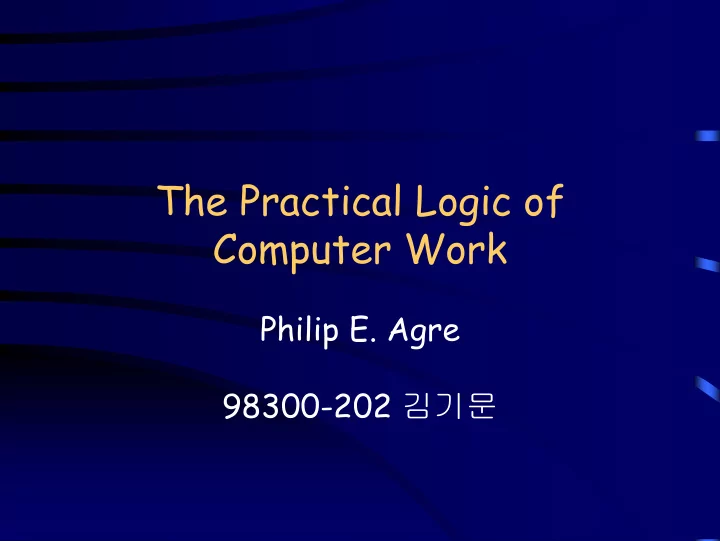

The Practical Logic of Computer Work Philip E. Agre 98300-202 김기문
Computationalism • vs Connectionism • Collection of theories about mind - Theories of representation (model of the world) - Theories of perception (mental model) - Theories of action (execution of plan)
Dissociation • Mind vs world • Mental activity vs perception • Plans vs behavior • The mind vs the body • Abstract ideals vs concrete things
Mind vs World • Mind - “container” metaphor, Lakoff and Johnson (1980) • World - hard to maintain accurate knowledge • World model – covertly conflated • Research “domain”
Mental Activity vs Perception • Symposium paper(1951), Karl Lashley • Behaviorist – stimulus-chaining • Cognitivist movement • The role of perception in organizing behavior
Plans vs Behavior • Plans and the Structure of Behavior (1960) - Miller, Galanter, and Pribram • Prescripted plan vs Plan that unfolds incrementally trough time • TOTE unit “Reactive planning”
The Mind vs The Body • STRIPS model (1972) – Fikes, Hart, and Nilsson • Mind - constructs plans • Body - executes plans • Unintended situation • Rapid alternation
Abstract Ideals vs Concrete Things • Tradition of Fregean semantics • Psychologism – the theory that meaning are mental entities • Platonism – the theory that meanings reside in timeless, extensionless realam of ideals • Mathematical entities
Conclusion • Part of the history of Western thought • World – negative, chaotic principle • Mind – positive, ordering principle • It Doesn’t Work That Way • Recognize the order inherent in the world • Listen to and learn from reality
Recommend
More recommend